Welcome to our article on Angelica Root, a versatile herb with a range of potential benefits for your health and wellness. Whether you’re seeking relief from digestive issues, menstrual cramps, respiratory problems, stress, skin concerns, hair health, immune support, or joint pain, Angelica Root may have something to offer you.
Angelica Root, specifically Angelica archangelica and Angelica sinensis, has been used for centuries in traditional and herbal medicine. While scientific evidence is limited, preliminary studies have shown promise in exploring the uses and benefits of Angelica Root.
In this article, we’ll delve into the specifics of Angelica Root, including what it is, how it’s used, the potential benefits of Angelica sinensis and Angelica archangelica, precautions to consider, dosage recommendations, its role in traditional medicine and folklore, and the myth versus reality of its benefits.
Before incorporating Angelica Root into your wellness routine, it’s always best to consult with a healthcare provider or herbalist to ensure safety and determine the appropriate usage for your specific needs. Let’s explore the world of Angelica Root together and discover its potential for enhancing your health and well-being!
Understanding Angelica Root
Angelica root, derived from the plants in the Angelica genus, is renowned for its various health benefits. Two prominent species of Angelica root are Angelica archangelica and Angelica sinensis. These plants are characterized by their tall stems, clusters of flowers, and distinctive scent. Angelica archangelica is widely used in European countries to address digestive issues, circulation problems, and anxiety, while Angelica sinensis plays a vital role in traditional Chinese medicine for its effect on hormonal balance, digestive support, and liver detoxification. Both types of Angelica root hold immense potential for enhancing well-being and providing numerous advantages for your health.
Angelica root has a diverse range of applications. It can be utilized in culinary practices, such as the production of gin and as an embellishment for various dishes. However, its primary use lies in herbal remedies. For centuries, Angelica root has been an essential component of traditional medicine in Europe and China. Supplements and herbal medicine products containing Angelica archangelica often include the roots, seeds, fruits, and flowers of the plant. On the other hand, Angelica sinensis products primarily consist of the root itself.
Not only does Angelica root offer potential benefits for overall well-being, but it also possesses an intriguing history rooted in traditional medicine and folklore. This plant has been used for centuries to combat illnesses, ward off evil spirits, and even as a sacred herb with symbolic significance. While these historical claims may lack scientific evidence, they contribute to the cultural significance and fascinating heritage of Angelica root.

| Key Characteristics of Angelica Root | Angelica archangelica | Angelica sinensis |
|---|---|---|
| Common Uses | Digestive problems, circulation issues, anxiety | Hormonal balance, digestive support, liver detoxification |
| Physical Features | Tall stems, clusters of flowers, strong scent | Tall stems, clusters of flowers, strong scent |
| Traditional Medicine | Europe | China |
Unlocking the Therapeutic Potential
Angelica root possesses the power to enhance our physical and mental well-being. While the benefits of Angelica root are widely recognized, it is vital to differentiate between myth and reality and rely on robust scientific research. Despite the preliminary studies supporting Angelica root’s efficacy, additional comprehensive research is necessary to fully comprehend its effects, optimal dosage, and safety for individuals. As you consider incorporating Angelica root into your wellness routine, it is essential to consult with healthcare professionals or herbalists to ensure it aligns with your specific needs and goals.
How is Angelica Root Used?
Angelica root serves various purposes, including culinary uses and herbal remedies. In the culinary world, it is often used in the production of gin, providing a unique flavor profile to the spirit. Additionally, the root of the Angelica plant can be used as a garnish or decoration in dishes, adding an aromatic touch to the presentation.
However, the primary use of Angelica root lies in its herbal remedies. For centuries, Angelica root has been utilized in traditional medicine both in Europe and China to address a range of health concerns. Commonly found in Angelica archangelica supplements and herbal medicine products, the root, seeds, fruits, and flowers of the plant are often combined to create effective remedies. On the other hand, Angelica sinensis products typically focus solely on the root itself, harnessing its medicinal properties.
Whether in the form of supplements or herbal preparations, Angelica root is revered for its potential health benefits. Its traditional use in Europe and China attests to its versatility in addressing various ailments and promoting overall well-being.

Angelica Root in Culinary Applications
In the culinary world, Angelica root is valued for its unique flavor and aromatic qualities. It is widely used in the production of gin, contributing to the distinctive taste of this beloved spirit. The root is typically added during the distillation process, infusing the gin with its herbal and slightly sweet notes.
Furthermore, Angelica root can be utilized as a garnish or decoration in various dishes. Its vibrant green color and strong scent make it an appealing addition to both sweet and savory creations. From salads and cocktails to baked goods and desserts, Angelica root adds a delightful touch to culinary ventures.
Angelica Root in Herbal Remedies
Angelica root has long been recognized for its potential medicinal properties. Traditional medicine in both Europe and China has relied on the plant for its numerous health benefits. By harnessing the power of Angelica archangelica and Angelica sinensis, herbalists and practitioners have created remedies to address various health concerns.
| Health Concerns | Angelica archangelica | Angelica sinensis |
|---|---|---|
| Digestive Support | Used to alleviate digestive issues such as indigestion and bloating. | Known to support healthy digestion and promote gastrointestinal balance. |
| Hormonal Balance | Traditionally used to regulate hormonal fluctuations in the body. | Frequently used in traditional Chinese medicine for women’s health and hormonal balance. |
| Respiratory Health | May provide respiratory support and help alleviate coughs and congestion. | Used to support respiratory health and maintain lung function. |
| Stress Relief | Traditionally employed to reduce stress, anxiety, and promote relaxation. | Known for its calming properties and ability to help manage stress levels. |
| Skin Health | Used topically for its potential benefits in promoting healthy skin. | – |
| Hair Health | May help improve the condition and appearance of hair. | – |
| Immune System Support | Traditionally believed to boost the immune system and support overall health. | – |
| Joint Pain Relief | Frequently used to alleviate joint discomfort and promote joint health. | – |
Note: While traditional use and preliminary studies show promise for these uses, further scientific research is required to confirm the efficacy and safety of Angelica root for specific health concerns.
Benefits of Angelica Root: A. sinensis
Angelica sinensis, also known as dong quai, offers a range of potential benefits for your health and well-being. This herb has been used in traditional medicine for centuries, and its uses continue to intrigue researchers today. Let’s explore some of the key benefits associated with Angelica sinensis:
1. Wound Healing
Angelica sinensis may support wound healing by promoting the formation of new blood vessels, a process known as angiogenesis[1]. This herb’s properties could potentially stimulate blood flow to the injured area, aiding in the healing process.
2. Menopausal Hot Flashes
Menopausal hot flashes can be discomforting, but Angelica sinensis might offer some relief. While more research is needed, some studies suggest that this herb could help manage hot flashes[2]. If you are experiencing menopausal symptoms, consider discussing this option with your healthcare provider.
3. Arthritis Relief
Thanks to its anti-inflammatory properties, Angelica sinensis could potentially provide relief for arthritis symptoms. Inflammation plays a crucial role in joint pain, and managing it effectively is essential for improved comfort and mobility[2].
Incorporating Angelica sinensis into your healthcare routine may offer various benefits, but it’s important to note that further research is required to fully understand its effects and establish recommended dosages. Consult with a healthcare professional to determine if Angelica sinensis is suitable for your specific needs and circumstances.

References:
- Wu, S., et al. (2012). Angelica sinensis Polysaccharide Promotes Angiogenesis via VEGF and VEGFR-2 Signaling Pathway. Cell Biochemistry and Biophysics, 62(1), 257-265.
- Moyad, M. A. (2017). Menopause Management: Update on Botanicals, Especially Angelica sinensis, Cimicifuga racemosa, and Phytoestrogens. Current Urology Reports, 18(9), 73.
Benefits of Angelica Root: A. archangelica
A. archangelica, also known as wild celery, offers potential benefits for various health concerns. While further research is needed, preliminary studies indicate its promising properties in cancer prevention, antimicrobial effects, and anxiety relief.
Cancer Prevention
A. archangelica has demonstrated the ability to prevent or inhibit the growth of certain cancer cells, as observed in both test-tube and animal studies. These findings suggest that Angelica archangelica may hold promise as a natural cancer prevention agent.
Antimicrobial Effects
This wild celery has shown antimicrobial activity, providing defense against harmful bacteria, viruses, and fungi. Its ability to combat these pathogens may contribute to maintaining a healthy immune system and overall well-being.
Anxiety Relief
Preliminary studies conducted on animals suggest that A. archangelica may possess anxiety-relieving properties. However, further research is required to validate these findings and determine the efficacy and safety of using Angelica archangelica for anxiety relief in humans.
While the potential benefits of A. archangelica are promising, it is essential to note that more comprehensive scientific studies are needed to fully understand its effectiveness, optimal dosage, and potential side effects. Before incorporating Angelica archangelica into your wellness routine, consult with a healthcare professional for personalized advice.

| Benefits of Angelica Root: A. archangelica | ||
|---|---|---|
| Cancer Prevention | Antimicrobial Effects | Anxiety Relief |
| – Potential to prevent or inhibit certain cancer cells – Further research needed to validate findings |
– Demonstrates antimicrobial activity – May combat harmful bacteria, viruses, and fungi |
– Animal studies suggest anxiety-relieving properties – More research required to validate findings in humans |
Downsides and Precautions of Angelica Root
While Angelica root is generally considered safe when consumed in moderate amounts, it is important to be aware of the potential side effects and take necessary precautions. Some of the downsides and precautions for taking Angelica root include:
1. Side Effects
Although rare, some individuals may experience side effects when consuming Angelica root. These side effects can include:
- Gastrointestinal discomfort, such as upset stomach and diarrhea
- Allergic reactions, including rash, itching, and swelling
- Photosensitivity, leading to increased sensitivity to sunlight and potential skin reactions
2. Drug Interactions
Angelica root may interact with certain medications, leading to adverse effects. It is important to consult with a healthcare professional if you are taking any of the following medications:
- Blood thinners: Angelica root, particularly A. sinensis, may enhance the effects of blood-thinning medications, increasing the risk of bleeding.
- Medications with a grapefruit warning: Both A. sinensis and A. archangelica can interact with medications that carry a grapefruit warning, potentially altering their effectiveness and increasing the risk of side effects.
3. Precautions for Specific Groups
There are certain groups of individuals who should exercise caution and avoid taking Angelica root:
- Pregnant and breastfeeding women: Due to limited safety information, it is recommended that pregnant and breastfeeding women avoid taking Angelica root.
- Children: The safety and effectiveness of Angelica root in children have not been well-studied. It is best to consult with a pediatrician before giving Angelica root to children.
- Individuals with certain medical conditions: If you have a history of hormone-related cancers, liver diseases, or clotting disorders, it is advisable to consult with a healthcare professional before using Angelica root.
It is always important to consult with a healthcare professional or herbalist before incorporating Angelica root into your health regimen, especially if you have any pre-existing medical conditions or are taking medications.
Remember, natural remedies like Angelica root may have potential benefits, but they also come with risks. It’s crucial to prioritize your safety and consult with a healthcare professional to determine if Angelica root is suitable for you.

Dosage and Recommendations for Angelica Root
When it comes to using Angelica root for your health and wellness, finding the right dosage and following proper recommendations is key. While there is no established standard dosage for Angelica root, the optimal dose can vary depending on the individual and the specific health concern. It is always important to consult with a healthcare provider or herbalist for personalized dosage and usage recommendations.
Angelica root is available in various forms, including capsules, liquid extracts, and dried tea. This gives you the flexibility to choose the option that aligns best with your preferences and needs. If you’re unsure about which form to use, seek guidance from a healthcare professional who can advise you on the most suitable option.
When starting to incorporate Angelica root into your wellness routine, it is generally recommended to begin with a low dose and gradually increase if needed. This approach allows your body to adjust and helps you gauge the effectiveness of the herb in addressing your specific health concerns.
In addition to considering the dosage, it’s essential to follow recommended usage guidelines. Always read the instructions on the product packaging carefully and adhere to any specific guidelines provided by your healthcare provider. This will ensure safe and effective use of Angelica root supplements.
Tips for Using Angelica Root:
- Start with a low dose and gradually increase if needed
- Follow the recommended usage guidelines provided on the product packaging
- Consult with a healthcare provider or herbalist for personalized dosage recommendations
- Choose the form of Angelica root that suits your needs, such as capsules, liquid extracts, or dried tea
Remember, Angelica root is a powerful herb with potential benefits, but it’s essential to use it responsibly and in consultation with healthcare professionals. By doing so, you can maximize the potential benefits while minimizing any potential risks or side effects.

Angelica Root Uses in Traditional Medicine and Folklore
Angelica root has a rich history in traditional medicine and folklore. For centuries, it has been used to address a wide range of health concerns and has been associated with various symbolic and spiritual beliefs.
“Angelica root, with its powerful healing properties, has been cherished for generations by healers and practitioners of traditional medicine.”
One of the traditional uses of Angelica root is protection against evil spirits. It has been believed to ward off negative energies and provide spiritual purification. Additionally, Angelica root has been associated with folklore surrounding the cure for the plague. It was thought to possess potent antibacterial and antiviral properties and was used to treat this devastating disease.
Moreover, Angelica root has been considered a holy herb in certain cultural traditions. It was believed to have divine origins and was used for spiritual rituals and ceremonies.
While these traditional uses and beliefs may not be supported by scientific evidence, they play a significant role in the cultural significance of Angelica root.

Angelica Root Folklore Fact Sheet
| Traditional Uses | Brief Description |
|---|---|
| Protection against evil spirits | Angelica root was believed to repel negative energies and provide spiritual purification. |
| Curing the plague | It was thought to possess antibacterial and antiviral properties and was used in the treatment of the plague. |
| Holy herb | Angelica root was considered a sacred plant and used in spiritual rituals and ceremonies. |
Potential Benefits of Angelica Root: Myth vs. Reality
Angelica root has long been associated with numerous health benefits, but it’s important to separate fact from fiction. While some benefits have been supported by preliminary research, many are based on traditional use and anecdotal evidence. In order to truly understand the efficacy, safety, and optimal dosage of Angelica root, rigorous scientific studies are needed.
Although the science behind Angelica root benefits is still evolving, several potential advantages have emerged:
- Promotes Digestive Health: Some evidence suggests that Angelica root may aid in digestion by promoting the production of digestive enzymes and reducing inflammation in the gastrointestinal tract.
- Supports Menstrual Health: Angelica root has traditionally been used to alleviate menstrual cramps and regulate irregular periods. However, further research is necessary to confirm these benefits.
- Boosts Respiratory Health: The essential oils present in Angelica root may possess expectorant properties, helping to clear congestion and ease respiratory symptoms such as coughing and wheezing.
- Provides Stress Relief: Angelica root has been used in traditional medicine for its calming properties and potential ability to reduce stress and anxiety. However, additional studies are needed to establish its effectiveness.
- Enhances Skin and Hair Health: Angelica root contains antioxidants that may protect the skin against damage caused by free radicals and promote healthy hair growth. However, clinical research confirming these benefits is still ongoing.
- Strengthens the Immune System: The root’s immunomodulatory effects may help support immune system function and combat certain pathogens. However, further research is needed to understand the extent of these benefits.
- Aids in Joint Pain Relief: Angelica root possesses anti-inflammatory properties that may reduce joint pain and inflammation. However, more research is required to determine its efficacy compared to conventional treatments.
While these potential benefits are promising, it’s essential to approach them with caution. Always consult with a healthcare professional before incorporating Angelica root into your wellness routine, especially if you have any underlying health conditions or are taking medications.
“While some benefits of Angelica root are supported by preliminary research, many claims are based on traditional use and anecdotal evidence. It’s important to wait for more comprehensive scientific studies to fully understand its potential benefits and risks.”

Conclusion
Angelica root, particularly Angelica archangelica and Angelica sinensis, has been used for centuries in traditional and herbal medicine for various purposes. Its potential benefits span across multiple areas of health and wellness, including digestion, respiratory health, wound healing, hormonal balance, and arthritis relief.
While preliminary studies show promising results, more comprehensive research is needed to fully understand the effects, dosage recommendations, and safety of Angelica root. Therefore, it is important to consult with a healthcare provider or herbalist before incorporating Angelica root into your wellness routine.
Despite the need for further scientific investigation, Angelica root remains a fascinating herb with a rich history and cultural significance. With its potential to support various aspects of health, Angelica root continues to be appreciated and utilized by those seeking natural remedies and traditional medicine.
FAQ
What are the uses of Angelica Root?
Angelica Root has been traditionally used for digestion support, hormonal balance, respiratory health, stress relief, skin health, hair health, immune system support, and joint pain relief.
What is Angelica Root?
Angelica Root refers to the roots of the Angelica archangelica and Angelica sinensis plants, which have been used in traditional and herbal medicine for various purposes.
How is Angelica Root used?
Angelica Root can be used in culinary applications and is primarily used as an herbal remedy in supplements and herbal medicine products.
What are the benefits of Angelica Root for A. sinensis?
Angelica sinensis, also known as dong quai, has potential benefits in wound healing, managing menopausal hot flashes, and providing relief from arthritis symptoms.
What are the benefits of Angelica Root for A. archangelica?
Angelica archangelica has shown promise in preventing the growth of certain cancer cells, has antimicrobial effects, and may help reduce anxiety.
What are the downsides and precautions of Angelica Root?
Angelica Root may have potential side effects, interact with certain medications, and can cause photodermatitis and contact dermatitis. It should be avoided by pregnant and breastfeeding women.
What is the dosage and recommendations for Angelica Root?
There is no established standard dosage for Angelica Root, and it is recommended to start with a low dose and consult with a healthcare provider or herbalist for personalized recommendations.
What are the uses of Angelica Root in traditional medicine and folklore?
Angelica Root has a rich history in traditional medicine and folklore, associated with beliefs of protection against evil spirits, treating the plague, and being a holy herb.
What are the potential benefits of Angelica Root: Myth vs. Reality?
While some benefits of Angelica Root have been supported by preliminary research, many are based on traditional use and anecdotal evidence. More comprehensive research is needed to fully understand its effects.
Source Links
- https://betterme.world/articles/angelica-root-benefits/
- https://www.healthline.com/nutrition/angelica-root
- https://www.localhouseofhealth.com/discovering-the-mystery-of-angelica-root/

